
Millions of children and adults participate in team sports, which are defined as athletic activities that require a group of individuals organized into opposing teams to compete. The primary objective of team sport is to win by outscoring the opponent. These objectives may be accomplished through a variety of means such as scoring goals or achieving certain points in a game or match. Team sports also involve a high level of commitment from athletes to regularly attend practice sessions, comply with instructions from coaches and train strenuously in preparation for competitions. These features distinguish sport teams from other forms of social groups because they provide clear norms that are accepted by all members.
Despite their competitive nature, team sports also foster the development of interpersonal skills that can benefit adolescents throughout their lives. These skills include cooperation, compromise and problem-solving, which are vital in the workplace and other areas of life. These soft skills become personal attributes that allow young people to develop healthy, productive relationships.
Additionally, participating in team sports teaches children the importance of regular exercise and the value of hard work. Athletes are trained to put in the hours to prepare for competitions and to understand that there is no short cut to success, and that failure is an inevitable part of the process. This lesson translates to the classroom and into life in general, where it is important for children to learn how to cope with setbacks and not dwell on them.